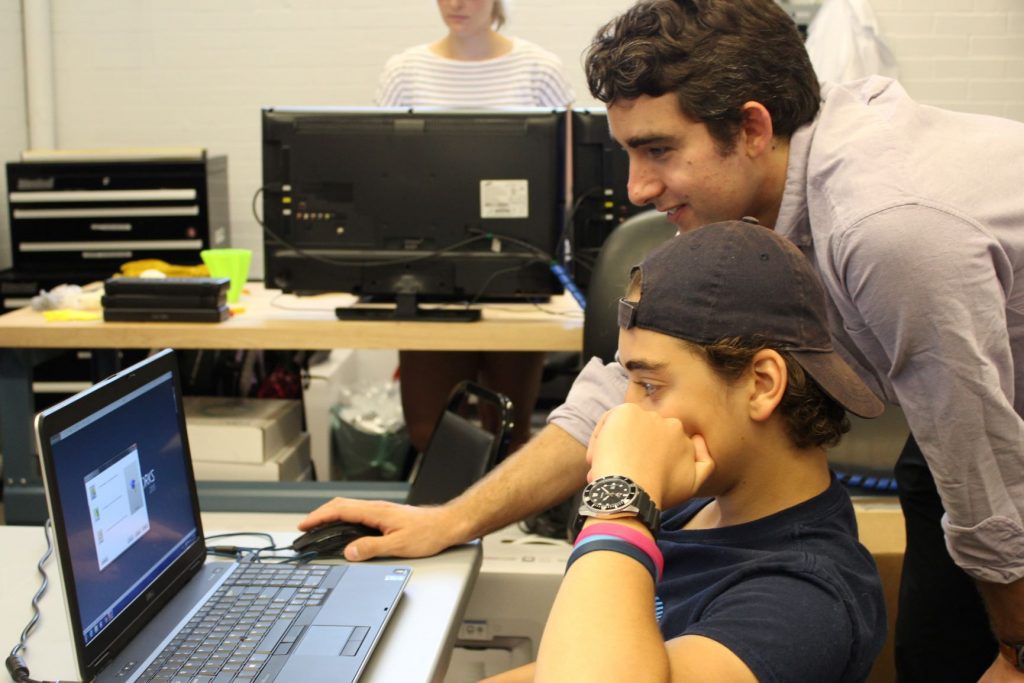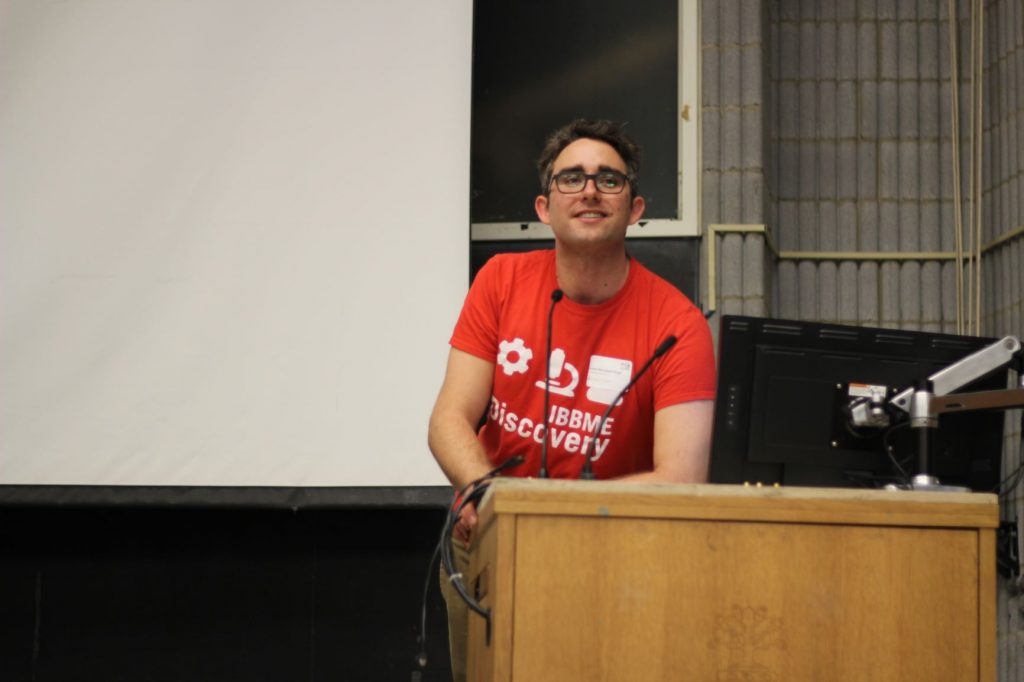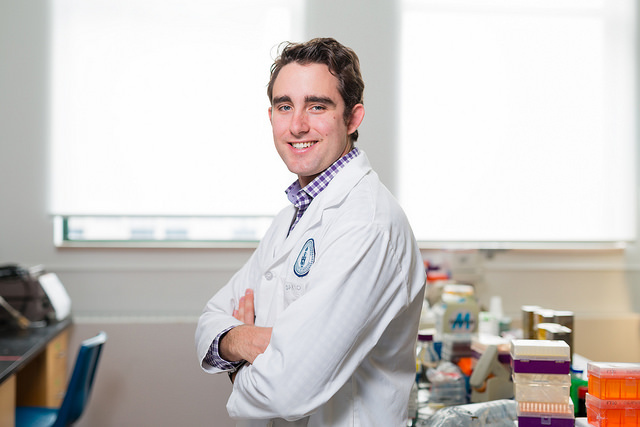Dr. Locke Davenport-Huyer graduated in 2019 with a Doctor of Philosophy (PhD) in Chemical and Biomedical Engineering. During his time at the University of Toronto, Locke has authored over 30 publications and co-founded Discovery, an educational STEM initiative that seeks to bridge the gap between high school and post-secondary studies. He is currently a post-doctorate researcher at Johns Hopkins University. Locke will be starting his new role as an Assistant Professor at Dalhousie University in the Department of Applied Oral Science in July 2021. Here, he shares some of his insights on his path in academia and how he makes an impact outside of his research.
Can you briefly describe your career path from undergraduate to post-graduate?
I did my undergrad at Queen’s University, and I majored in biomedical and chemical engineering. Afterwards, I decided to pursue a Masters Degree in biomaterials-based engineering at the University of Toronto under Dr. Milica Radisic. This decision was mainly driven by her bench-to-bedside style engineering solutions that could tangibly be used in the clinic. A couple of years later, I transitioned into a PhD and found my own niche within the lab doing polymer chemistry, helping to push forward their materials design in the biomaterial space with an organic chemistry-based approach. My research was focused on the development of synthetic, mechanically tunable materials in the space of cardiac tissue engineering and on investigating how those materials interacted with the body.
At the end of my graduate studies, there were multiple different career paths I could have taken. But something that’s always been important to me is how I can interact with people in a way that pushes a community of practice forward. I really enjoy the practice of mentorship, whether that’s in the context of teaching, research in supervision, or talking to people. Mentorship has always been important to me, and I just didn’t see a better way to do that than as a faculty member.
I continued down that research path and will be a professor in the summer of 2021 at Dalhousie University. Right now, I’m doing a postdoctoral fellowship at Johns Hopkins University because I think it’s important in an academic career to get more experience in different research areas and in different labs. My current research interests include investigating the mechanisms behind foreign body reaction and designing biomaterials that work synergistically with microenvironments in the immune system to reduce inflammation. Now, I’m looking forward to balance the importance of teaching and of research accordingly in a faculty position.
Did you always think that you would end up in academia? If not, when did you make the switch?
I’ll be very blunt – absolutely not. For the first three years of my PhD, I thought that I would never be an academic. The reasoning was two-fold. Number one: I didn’t think I was cut out for that. I thought it was too hard. How do people come up with these crazy ideas and how do they investigate them effectively? Number two: I don’t think I fully understood how important mentorship was.
For me, I wholeheartedly believe that the reason I changed path on that was because of Discovery, an educational initiative that I helped co-found that exposes high school students to biomedical engineering through capstone-style projects integrated in their classes. Through Discovery, I had the opportunity to interact with many faculty members and saw that no one fully knows what they are doing – not even professors. But everyone gets through it, and they figure out ways to do their research or teach their courses. Additionally, my experience of having a novel idea to develop and implement an educational framework for Discovery and then seeing that idea be accepted and executed was very validating. I believe that my research began to thrive afterwards because I realized that I do have ideas that can help and impact people, and other people care about what I think.
On top of that, I realized that I really do love mentorship and the interactions that I can have with others in academia. I’m not sure that I love teaching per se, but what I do like is making impact through driving change. I also think that the interactions with people in academia are different than what you might get in an industry job, which can be hierarchical and regimented. Academia gives you this freedom to talk to whomever you want, whenever. There are no rules governing if I email researchers at another institution and discuss potential ideas.

Why did you start Discovery?
I remember thinking, how could we better prepare the future generation of STEM people? I’ve always believed that education is what drives society forward. High school teachers especially help shape teens in their late adolescent years before they go out and live life for themselves. However, I saw a gap in which the traditional high school curriculum is more knowledge-based, whereas when students enter post-secondary studies, they must quickly transition into a more inquiry-based model of learning. I wanted to make a difference and leverage tools to try and impact the way people think and solve problems in a more systematic way. Thus, we created a learning community where we can collaborate with high school teachers to provide opportunities for students to develop problem-solving and inquiry skills in STEM and in biomedical engineering.
Biomedical engineering just doesn’t exist for students in high school. It’s not something they understand, and by providing them with capstone-style projects around biomedical engineering, we can give them really cool opportunities. They know what cancer is, they know what cells are, and they think microscopes are awesome. Through Discovery, we can further inspire that curiosity, but we can also build concrete skills on top of that. Beyond building the next STEM generation, I also believe that Discovery is about building people who can think critically about the world as they come out of high school. The people that we impact through this program might eventually make a better decision on, for example, how to design the next cure for cancer.

What advice would you have to current graduate students at BME?
The biggest advice that I have is to get involved in activities outside of your research. Sometimes, there will be months of experiments not working, and even though it’s part of the whole research journey, it can be frustrating. But if you have other extracurricular activities to do, whether it’s getting involved in something like Discovery, a student club, volunteering, sports, or doing anything where you can feel valued and useful, they can help you get through those times. It’s finding the thing that you love that may be a minor inconvenience when you’re busy because your research is working, but when your research is not working, it’s the crutch that gets you through it. And you can develop your personal and professional skills along the way.


